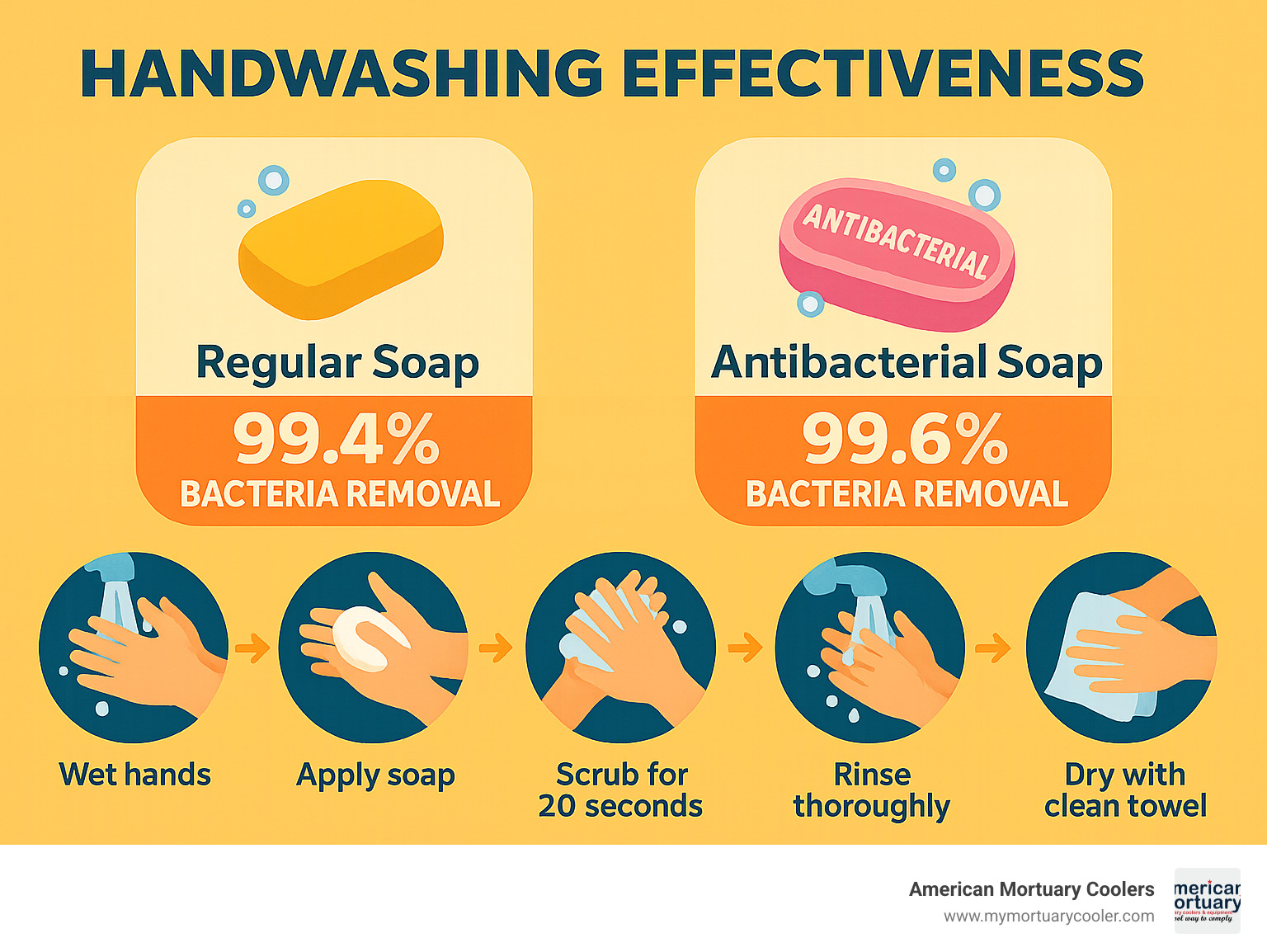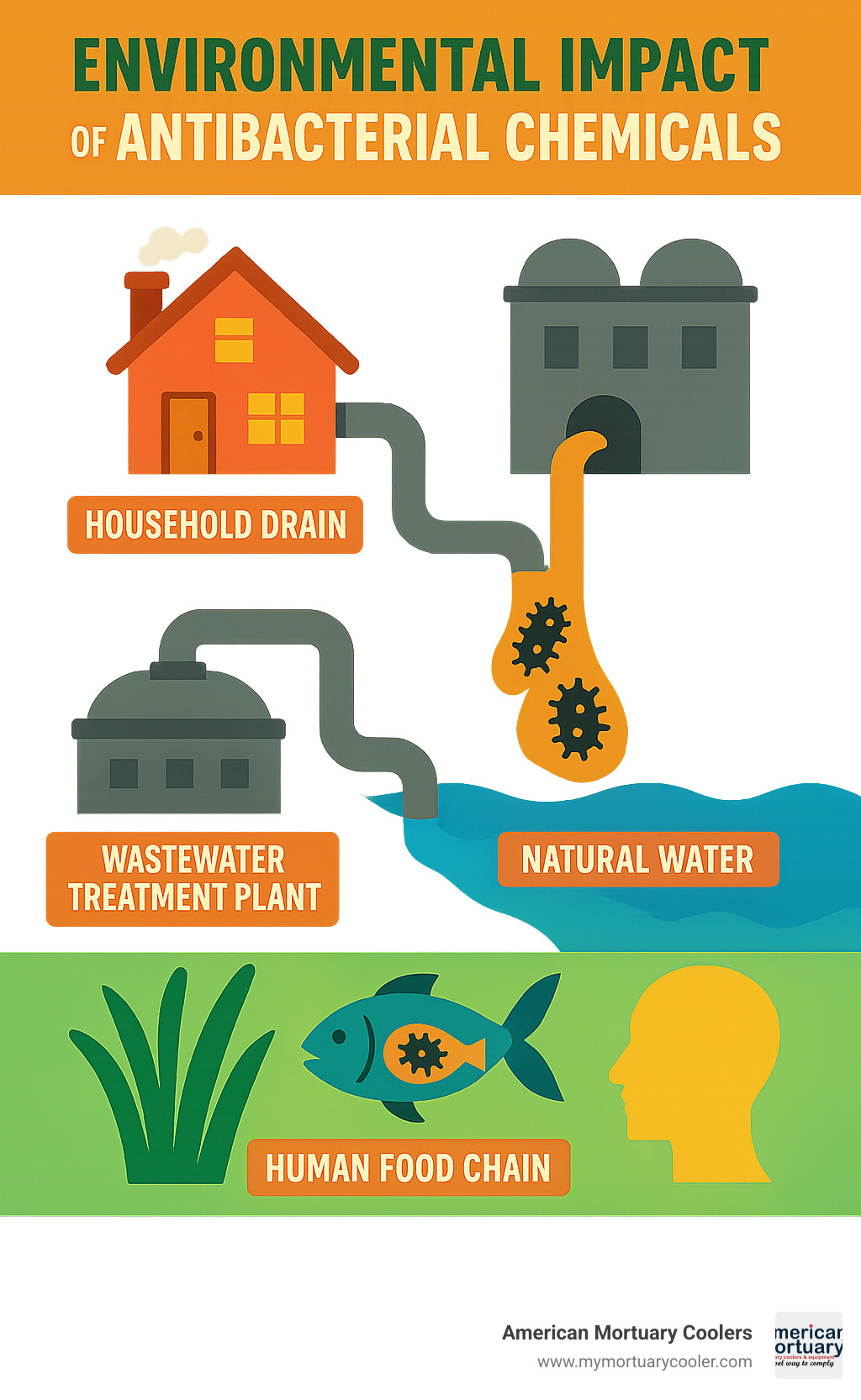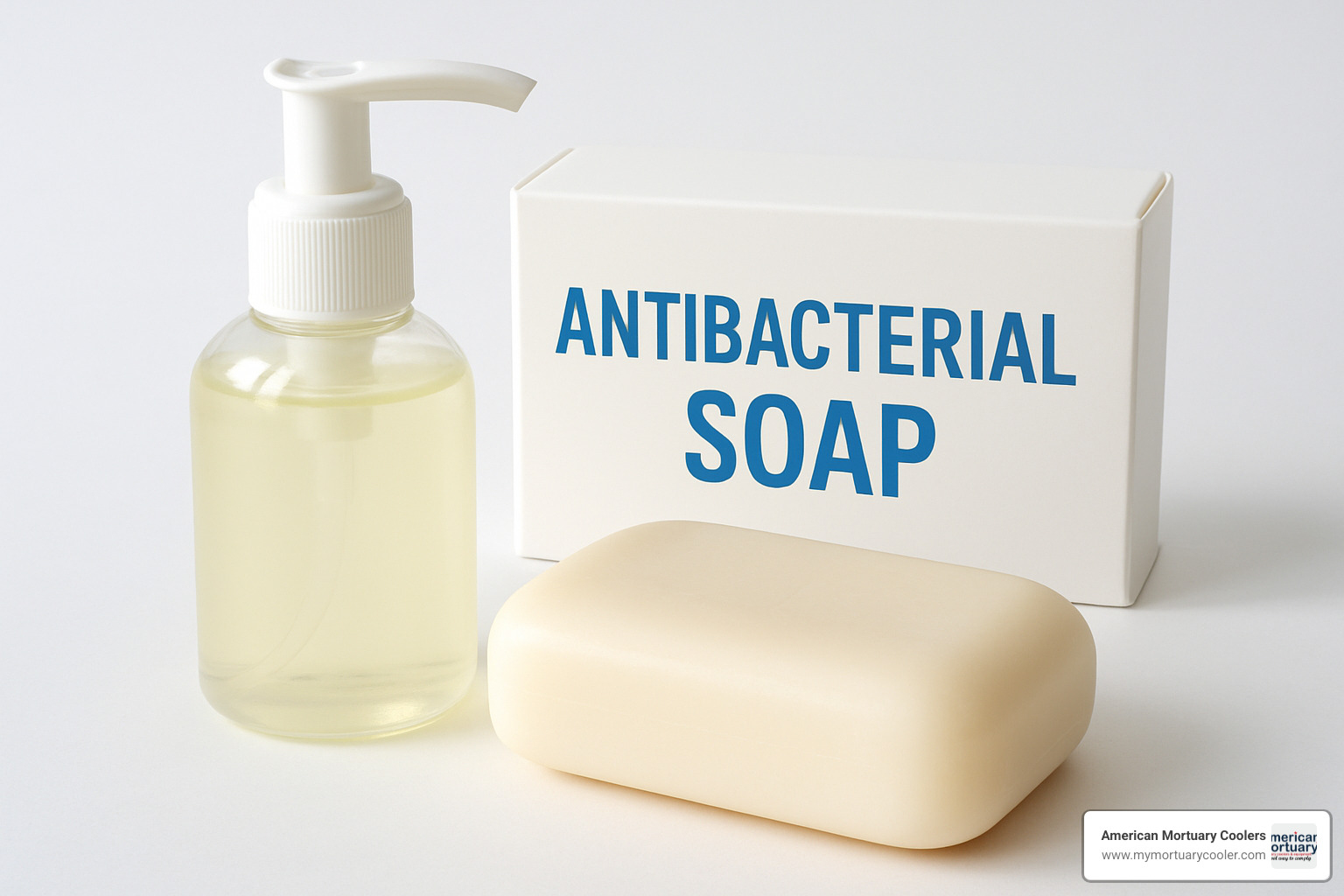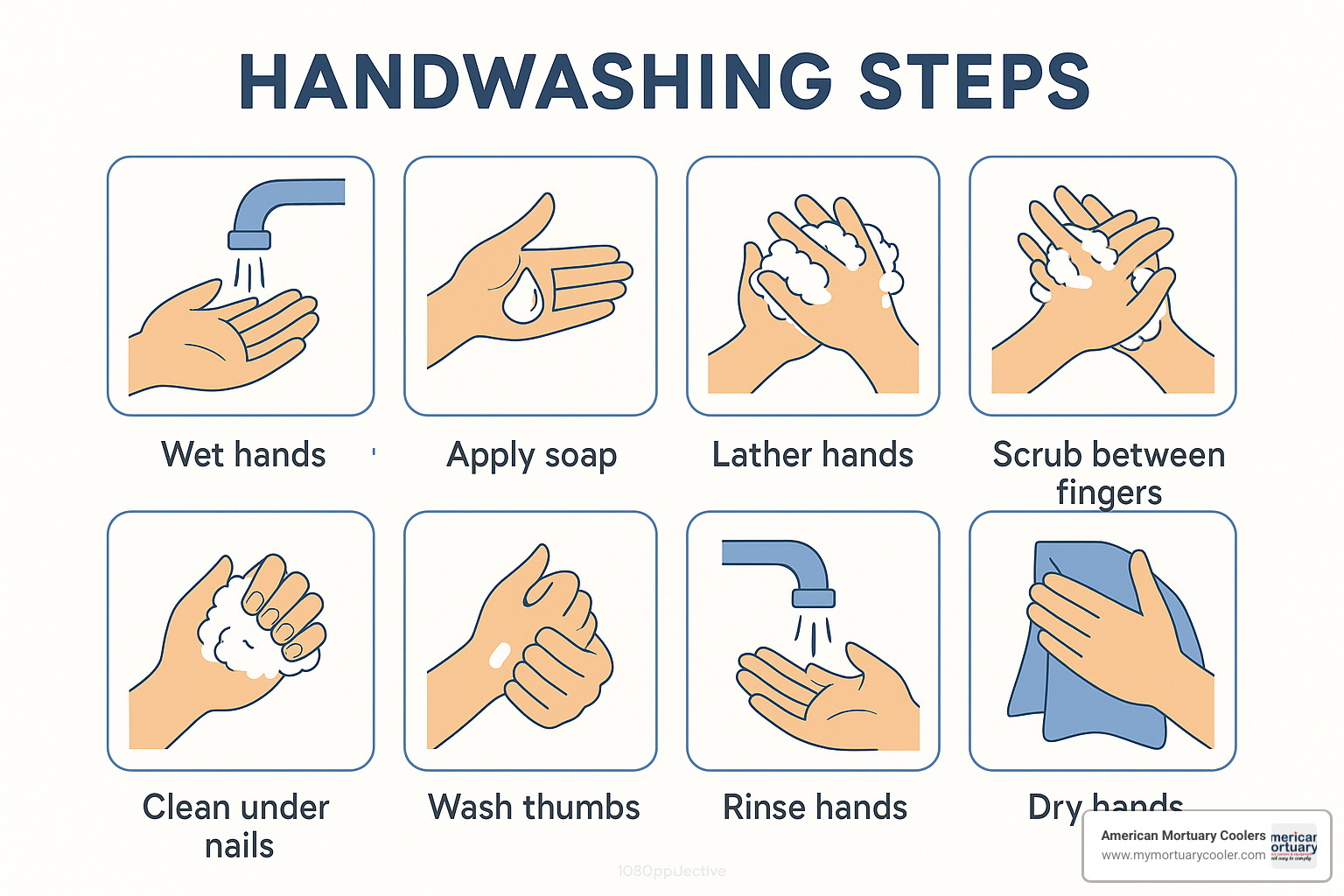Why Understanding Antibacterial Soap Matters for Your Health
Antibacterial soap contains special chemicals designed to kill bacteria on your hands, but research shows it may not be as effective as you think. The FDA has found no evidence that over-the-counter antibacterial soaps prevent illness better than plain soap and water.
Key Facts About Antibacterial Soap:
- Effectiveness: Only increases bacteria kill rate from 99.4% to 99.6% compared to regular soap
- FDA Action: Banned 19 common antibacterial ingredients in 2016, including triclosan
- Health Concerns: May contribute to antibiotic resistance and hormone disruption
- Cost: More expensive than regular soap with minimal added benefit
- Best Practice: Plain soap and water recommended for most situations
When you buy soap hoping the "antibacterial" label will keep your family safer, you might be surprised to learn that plain soap works just as well. The difference in bacteria-killing power is tiny - regular soap eliminates about 99.4% of germs while antibacterial versions bump that up to just 99.6%.
The bigger concern? Many antibacterial soaps contain chemicals that can harm both you and the environment. Triclosan, once the most common antibacterial ingredient, was banned from consumer soaps because manufacturers couldn't prove it was safe for daily use or more effective than regular soap.
For funeral home operations, understanding proper hand hygiene becomes even more critical. You need reliable, science-based cleaning protocols that actually work.

Antibacterial soap further reading:
- embalming of body
- periosteel elevator
- hydro aspirator
What Is Antibacterial Soap & How It Works
Antibacterial soap combines regular soap's cleaning action with antimicrobial chemicals designed to kill bacteria rather than just wash them away. However, that extra effort might not be worth it.
Regular soap works through surfactants - molecules that break down water's surface tension and lift away oils, dirt, and bacteria. This physical removal process is remarkably effective at eliminating germs, which is why proper handwashing technique matters more than soap type.
Antibacterial soap takes a different approach by adding chemicals that claim to kill bacteria on contact. The catch? Those antibacterial chemicals need to stay on your skin for about 2 minutes to actually kill bacteria effectively. Most of us wash our hands for only 20-30 seconds - barely enough time for the active ingredients to work.
The FDA found no evidence that over-the-counter antibacterial soaps prevent illness better than washing with plain soap and water. These products might give people a false sense of security, leading to less thorough handwashing.
Your skin naturally hosts beneficial bacteria that help maintain a healthy microbiome. Antibacterial chemicals can disrupt this balance by killing both harmful and protective bacteria, potentially making it easier for dangerous bacteria to establish themselves.
Common Active Ingredients in Antibacterial Soap
In 2016, the FDA banned 19 different antibacterial ingredients, including triclosan and triclocarban - the two most common chemicals found in these products for decades. The FDA told manufacturers: "Show us proof these ingredients are safe and more effective than regular soap, or they're gone." Most companies couldn't meet that challenge.
Triclosan was found in everything from hand soap to toothpaste, but animal studies showed it could interfere with hormone function and contribute to antibiotic-resistant bacteria.
Three ingredients remain under FDA review: Benzalkonium chloride, benzethonium chloride, and chloroxylenol. These aren't necessarily safer - they just haven't been fully evaluated yet.
The Scientific research on triclosan safety from the FDA explains exactly why so many ingredients were removed from consumer products.
Antibacterial Soap and Antibiotic Resistance
The overuse of antibacterial soap contributes to antibiotic resistance - one of the greatest threats to global public health according to the CDC.
Every time you use antibacterial products, you're running a survival-of-the-fittest contest on your skin. Most bacteria die, but the toughest, most resistant ones survive and multiply. Over time, these survivors can evolve into "superbugs" that resist standard antibiotics.
This creates cross-resistance - bacteria that become resistant to soap chemicals may also resist important medical antibiotics. Laboratory studies prove this connection exists.
In 2017, over 200 scientists and medical professionals signed a statement warning that antibacterial soaps may be "useless and potentially harmful." Their research suggests that killing an extra 0.2% of bacteria isn't worth the risk of creating resistant strains.
The Scientific research on resistance shows how consumer antibacterial products may create more problems than they solve.
Is Antibacterial Soap More Effective Than Regular Soap?
Antibacterial soap is barely more effective than regular soap, and that tiny difference doesn't translate to better health outcomes.
Regular soap eliminates about 99.4% of bacteria on your skin. Antibacterial soap bumps that number up to just 99.6%. That 0.2% improvement becomes meaningless in real-world use, especially since most people don't wash their hands correctly anyway.
The FDA's Reality Check
In 2013, the FDA demanded proof from manufacturers: "Show us that your antibacterial soaps are both safer and more effective than plain soap, or get them off the market."
After years of review, the FDA's conclusion was clear: there wasn't enough evidence to show that over-the-counter antibacterial soaps prevent illness better than washing with plain soap and water.
The False Security Trap
Using antibacterial soap can make you less safe by creating false confidence. People who rely on these products often develop sloppy habits, washing less frequently or spending less time scrubbing because they trust the "antibacterial" label.
| Feature | Regular Soap | Antibacterial Soap |
|---|---|---|
| Bacteria Kill Rate | 99.4% | 99.6% |
| Illness Prevention | Effective | No additional benefit |
| Cost | Lower | Higher |
| Environmental Impact | Minimal | Concerning |
| Resistance Risk | None | Potential |
| FDA Recommendation | Recommended | Not recommended |
FDA's Verdict on Antibacterial Soap
The FDA's 2016 ruling banned 19 active ingredients from consumer antibacterial products because manufacturers couldn't demonstrate these chemicals were safe for daily use or more effective than plain soap.
Triclosan and triclocarban were the biggest casualties, along with 17 other chemicals that had been marketed as essential for hygiene.
Three ingredients - benzalkonium chloride, benzethonium chloride, and chloroxylenol - remain under review while manufacturers provide additional safety data.
The FDA's recommendation is simple: "Wash your hands with plain soap and water."
Health Risks & Environmental Concerns
Antibacterial soap creates several concerning problems beyond questionable effectiveness.
Hormone Disruption: Animal studies revealed that triclosan can interfere with thyroid hormones that regulate metabolism and mood.
Environmental Impact: When washed down drains, antibacterial chemicals flow into rivers and oceans, disrupting aquatic ecosystems and accumulating in marine life.
Bioaccumulation: Studies have found triclosan in human breast milk, urine, and blood samples, proving our bodies absorb and retain these chemicals.
System Disruption: Antibacterial chemicals can kill beneficial bacteria essential for proper sewage treatment, reducing treatment plant effectiveness.

Considering that antibacterial soap offers virtually no health benefits over regular soap, these risks become impossible to justify.
When & Where Should You Use Antibacterial Soap?
For most people, most of the time, antibacterial soap isn't necessary. However, specific situations might justify its use.
Healthcare settings represent the clearest case for antibacterial products. In hospitals and clinics, patients often have weakened immune systems, and every fraction of germ-killing power might matter. Even here, proper handwashing technique matters more than soap type.
Food service operations, particularly when handling raw meat or serving vulnerable populations, might benefit from antibacterial products. Some health departments require them in certain food preparation settings.
High-risk environments like veterinary clinics, research laboratories, or childcare facilities during disease outbreaks might also justify antibacterial products.
For everyday home use, regular soap is better. Your family's routine handwashing doesn't require extra chemicals that might disrupt your skin's natural protective bacteria.

For professionals needing barrier protection beyond handwashing, our guide to nitrile gloves covers essential protective equipment information.
Bar Soap vs Liquid Options for Antibacterial Soap
Bar soap creates hygiene concerns when multiple people share the same bar, potentially harboring bacteria between uses. However, bars last longer and generate less packaging waste.
Liquid soap solves cross-contamination problems, especially with pump dispensers. This makes liquid formulations the clear choice for public restrooms and commercial facilities.
Foam formulas provide immediate coverage and often encourage longer scrubbing periods. The controlled dispensing can be more economical in high-traffic areas.
Hand Sanitizers vs Antibacterial Soap
Hand sanitizer with at least 60% alcohol kills germs quickly without contributing to antibiotic resistance. Unlike questionable antibacterial chemicals in soap, alcohol has proven effectiveness and works within seconds.
Sanitizer excels for on-the-go hygiene and provides viral coverage - killing both bacteria and viruses, including coronaviruses and influenza.
However, sanitizer doesn't work well on visibly dirty hands and is less effective against certain pathogens like norovirus.
Soap and water physically removes germs, dirt, and oils - irreplaceable when hands are actually dirty. Use soap and water when available, especially after bathroom use or before food preparation.
For comprehensive sanitizer guidance, see the Scientific research on sanitizer use from the FDA.
Best Practices for Clean Hands (Regardless of Soap Type)
Proper handwashing technique beats expensive antibacterial soap every time. The CDC's research shows that how you wash matters far more than what soap you use.
Thorough handwashing with plain soap removes nearly all germs and keeps you healthier than rushed washing with any antibacterial product.
The magic happens in 20 seconds of scrubbing. Most people only scrub for 6-8 seconds - barely enough time for soap to work.
Proper technique: Wet hands with clean running water, apply soap and lather thoroughly. Scrub for at least 20 seconds, covering backs of hands, between fingers, under nails, thumbs, and wrists. Rinse thoroughly and dry with a clean towel.
Water temperature doesn't matter - hot water doesn't kill germs better than cold water. The soap and scrubbing do the work.
Keep fingernails short and clean - long nails harbor germs that are nearly impossible to clean properly.
Moisturize after washing - dry, cracked skin makes it easier for bacteria to penetrate. Good hand moisturizer maintains your skin's natural protective barrier.
Timing matters: Wash before eating or food preparation, after restroom use, after coughing or sneezing, after touching public surfaces, and when caring for sick people.

For funeral service professionals, cleanliness extends beyond hands. Our guide on Lysol cleaner safety provides detailed disinfection protocols.
The bottom line: Twenty seconds of thorough scrubbing with any soap beats a quick rinse with expensive antibacterial products.
Frequently Asked Questions about Antibacterial Soap
Is antibacterial soap really better at preventing illness?
No, antibacterial soap doesn't prevent illness better than regular soap and water. This is the FDA's official conclusion after years of reviewing available studies.
Regular soap eliminates 99.4% of bacteria, while antibacterial versions achieve 99.6%. That 0.2% difference is meaningless for health outcomes.
The FDA stated: "Currently, there is no evidence that they are any more effective at preventing illness than washing with plain soap and water." Manufacturers had years to prove their products worked better and couldn't do it.
What prevents illness is proper handwashing technique - spending at least 20 seconds scrubbing all hand surfaces. Soap type matters far less than thoroughness.
Can using antibacterial soap make bacteria resistant?
Yes. Using antibacterial soap regularly contributes to antibiotic resistance, one of the most serious public health threats today.
Repeated use creates "selection pressure" - most bacteria die, but resistant strains survive and multiply. These survivors can develop into superbugs that resist standard antibiotics.
Cross-resistance means bacteria resistant to soap chemicals may also resist medical antibiotics. Laboratory studies prove this connection.
In 2017, over 200 scientists warned that widespread antibacterial product use might fuel the global antibiotic resistance crisis. The tiny benefit isn't worth the enormous risk.
Does antibacterial soap work against viruses like COVID-19?
Antibacterial soap isn't designed for viruses and shows no evidence of working better than regular soap against viral infections like COVID-19.
Regular soap is incredibly effective against viruses, including coronavirus. Soap molecules destroy the fatty envelope surrounding many viruses, killing them through physical disruption.
Antibacterial additives don't contribute to this viral destruction. That's why the CDC, WHO, and major medical organizations recommend plain soap and water for COVID-19 prevention.
Viral protection comes from proper technique - scrubbing for 20 seconds, covering every hand surface, and washing frequently. Mechanical action removes and destroys viruses regardless of soap type.
Conclusion & Next Steps
The science tells a clear story: antibacterial soap simply isn't worth the hype. After decades of research and extensive FDA review, we know that spending extra money on antibacterial formulations gives you almost nothing in return - just a tiny 0.2% bump in bacteria removal that won't make you any healthier.
What really matters? Your handwashing technique. Whether you're using the fanciest antibacterial soap or basic bar soap from the dollar store, proper scrubbing for 20 seconds with complete coverage of your hands will keep you safe and healthy.
The bigger picture is actually concerning. These products may be creating antibiotic-resistant bacteria while disrupting hormones and harming aquatic ecosystems. That's a lot of potential damage for such minimal benefit.
Here's what the evidence supports: Stick with plain soap and water for your daily routine. Save hand sanitizer with at least 60% alcohol for times when you can't get to a sink. Focus on washing your hands correctly and frequently rather than worrying about which brand or formulation to buy.
For those working in healthcare, food service, or other high-risk environments, follow your industry's specific guidelines. But even in these settings, many experts are moving back toward plain soap as the foundation of good hygiene practices.
At American Mortuary Coolers, we've built our reputation on providing funeral professionals with equipment that actually works - no fancy marketing claims, just reliable performance when it matters most. The same principle applies to hand hygiene: simple, proven methods consistently applied will always outperform complex solutions that promise more than they deliver.
From our facilities spanning Tennessee to California, we've seen how attention to basic safety protocols reflects the same commitment to excellence that goes into every custom mortuary cooler we build. Whether you're maintaining professional equipment or just washing your hands before lunch, the fundamentals matter more than the bells and whistles.
Your next step is simple: Next time you're shopping for soap, save your money and skip the antibacterial aisle. Grab regular soap, learn proper handwashing technique, and use that extra cash for something that will actually improve your health and safety.
For funeral service professionals who want to extend this commitment to cleanliness throughout their facilities, our guide on keeping equipment clean offers practical maintenance protocols that complement good hand hygiene practices.
Remember: the best soap is the one you actually use properly, every single time. Plain soap and water have been protecting people for generations - and they'll keep protecting you too.



















